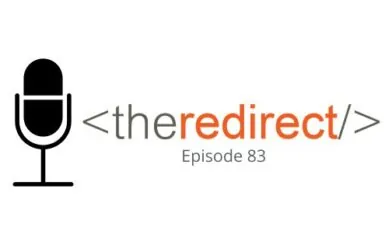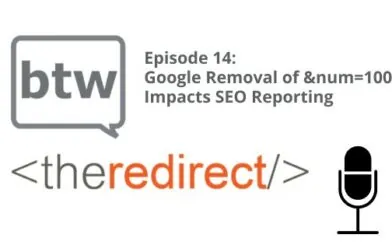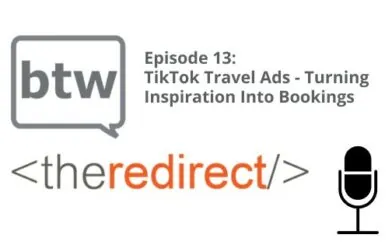Listen now:
Welcome to The Redirect Podcast, where the BlackTruck team shares recent insights and takeaways from the world of search marketing.
In this week’s episode:
- The AdWords Keyword Planner tool has been updated, and for the better. Patrick shares some great new features (begins at 1:42).
- Search beat out social media for site traffic in 2017 for the first time in three years. So what’s happening with social media? (Begins at 11:11)
New Google AdWords Keyword Planner
GUYS! There’s a new keyword planner tool from Google AdWords. It’s been updated and refreshed to match the new AdWords interface. It comes with new features in addition to improvements on navigation to basic needs.
It’s unclear on what the roll-out schedule is, but guess what? We have access!!! I (Patrick) was able to play around with it as I read about its new features. I’ll be honest and say that I had basically all but abandoned the Keyword Planner as we had gained access to other tools. I’m not going to jump back into it wholeheartedly, but I am going to give it a whirl and see how it’s been improved, and if it’s giving me better context to keywords and the volume trends it’s been showing.
It starts off with a much more clean and dumbed down start screen that’s not nearly as intimidating. Before, there were tons of filters and options to set. Now, it’s basically just “find new keywords” and “get metrics and forecasts.”
In the previous keyword ideas screen, we got used to seeing the trends graph that was difficult to read. Now, it’s including a separate bar in the schedule for mobile trends vs. total trends. Makes it a much clearer picture.
Filtering now works the same as filtering in the new AdWords. It’s fairly intuitive, as far as lining it up with how we’ve been trained to use the new AdWords.
Getting Organic
On the right top side of the suggestions list is the columns icon as we see in AdWords, and in here there are two new metrics that I am SUPER pumped about: Organic Impression Share and Organic Average Position. In order for these metrics to populate, AdWords and Search Console need to be linked together. I am PUMPED to play with this feature.
The greatest argument against using the old Keyword Planner as a keyword planning tool for suggestions in working the organic search game was that it was feeding us data based on paid results, and skewed the results.
With the inclusion of these two organic metrics, combined with the existing metrics provided in the Planner, a much, much more accurate determination of a keyword’s potential organic performance can be deduced.
That said, in the two PPC accounts I tested this on that had access to the new Keyword Planner, neither of them were populating these columns. Further testing will happen, as I had to sync both accounts with Search Console, one of which was also a fresh verification within Search Console itself. It’s possible they just hadn’t started talking yet. But in theory, I’m stoked for this feature.
Forecasting features are still present, but options get a little richer and easier to navigate while keeping device and location data on the same page ,whereas previously you were required to toggle between two tabs. These metrics are all adjustable on the same screen.
See more on Search Engine Land.
Search Wins 2017. So What’s Up With Social Media?
What sources were the biggest drivers of traffic to websites in 2017? A recent study from analytics platform Shareaholic reports that for the first time since 2014, search outpaced social media in the percentage of overall traffic it delivered in 2017. According to the data, search drove 34.8% percent of site visits in 2017, compared to social networks’ 25.6% of referral traffic.
Though Facebook’s share of visits dropped 25% year over year, it was still the top social network for share of visits in 2017.
This report comes on the heels of large changes to Facebook because of the 2016 presidential election. But are algorithm changes and measures to combat fake news the reason for social media’s drop in site referrals? Should social media marketers be freaking out about this?
Lately, many digital marketers have even questioned the value of a brand having an organic strategy on Facebook. But we should remember that social platforms exist for the purpose of being social, and most (if not all) users aren’t there looking to be sold to. That’s not to say you shouldn’t advertise on social media – at the end of the day, Facebook is a display network from an advertising perspective.
We know that social platforms are going to favor content that keeps users engaged on their site, rather than bringing users off of their site. It’s important to note that the Shareaholic report is strictly on site referrals and can’t speak to the value of a brand’s organic content that is engaging users on the social platform, thus building community and brand awareness or affinity.
Instagram-o-rama
Surprisingly, Instagram was the big winner for social media referrals, with a 890% increase in share of visits year over year. It had previously been quite difficult to drive traffic to your website from Instagram, since it could only be done through the link in your profile. Now, it’s much easier thanks to being able to include links in Instagram Stories (for accounts with more than 10,000 followers) and tag products in photos with a link directly to the product on your website.
Does Social Media Help With Search Performance?
Does what a brand does in social media – organic or paid – have an impact on organic search? Similar to discussions we’ve had on how paid search can indirectly impact organic search, social media can certainly have an indirect impact on organic search.
Social media can help build brand awareness and brand recognition, which can influence search; for instance, if a user is exposed to a certain brand in social ads, they may be more inclined to recognize and click on that brand if it were to show among search results later on. Alternatively, if a user sees a brand’s advertisement or organic post in their Facebook feed, even if they don’t end up clicking on the ad, they might be interested enough in the product/service that they’ll look it up in search later on.
Lost Facebook Referral Traffic Lately? Don’t Freak Out Yet.
If you are concerned that your site has seen a huge drop in traffic from Facebook in the last year, it may not be as bad as it seems: Consider that if you boost a post on Facebook, traffic from that post will likely show in Google Analytics as regular referral traffic from Facebook. This could really skew comparisons and make Facebook look like it’s underperforming for you compared to a previous period. If you suspect this might be the case, check Facebook Insights for any posts that may have been boosted during that time. Those paid boosts could account for big differences, so don’t just blame an algorithm or assume your social media manager’s been sleeping on the job lately.
For this reason, it’s important to integrate your teams, if you have different people working on different areas of digital strategy. Bring them together regularly so they understand what each other is doing and how what each team is doing could impact other areas of focus.
Also mentioned in this episode:
- MozPod episode on The Role of SEO in Branding
- Episode 34 of The Redirect Podcast on Google’s Mobile-First Index
Thanks for tuning in! To catch future episodes of The Redirect Podcast, subscribe on SoundCloud, iTunes, or Stitcher.



